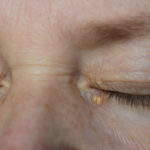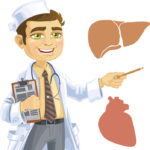
Previous
N-Acetyl Cysteine is a Liver’s Ally

Next
An Alternate Approach to Liver-Related Headaches
How to Choose a Liver Doctor
When choosing a physician regarding the health of your liver, you’ll find many doctors possess different levels of training and offer various areas of expertise and medical approaches. As a patient, you will be making a number of important decisions together with your doctor, and you can help ensure a positive experience by matching your own goals and priorities with those of your chosen physician.
If you are living with liver disease, nearly every decision related to your health must be presided over by your doctor. Dependant upon the individual’s resources, some people may not realize the range of professionals capable of serving as their partner in navigating liver disease. Once the differences between liver specialists are understood, it will be easier to choose a provider that suits you best. By matching your personal goals and priorities with those of your doctor, it is possible to have a positive experience treating and managing liver disease.
Initial Detection
There are many different kinds of doctors who evaluate and treat people with liver disorders. Typically referred to as primary care physicians (PCPs), a family physician or internist is often the first doctor to discover you harbor a liver problem. Since the early stages of liver disease are one of the few chronic illnesses exhibiting little to no symptoms, routine testing is the most common method of detection. Once liver disease is suspected, PCPs will usually refer their patients to a specialist for further evaluation and treatment.
Although your PCP may refer you to see a specialist within his/her network, your choices needn’t be limited by your doctor’s suggestions. There are many types of specialists who focus on the liver, and understanding the breadth of choices gives you the tools for finding a specialist who will cater best to your specific needs.
Types of Doctors
In order to clarify the differences between the different types of doctors, below is a simplified guide. Doctors are delineated here by their amounts of education and training, with increasing levels for each additional segment of clinical training.
Level 1 – These doctors have completed four years of medical school training and a minimum of one additional year of training as an intern. In order to legally practice medicine, Level 1 doctors must pass a state licensing exam. There are two kinds of doctors at this level: an MD or a DO.
· Medical Doctor (MD) – By completing a traditional medical school program, an MD is otherwise known as an allopathic physician.
· Doctor of Osteopathy (DO) – By completing a four-year osteopathic school, DOs are commonly referred to as osteopaths. Osteopaths focus on treating “the body as a whole,” particularly on the body’s ability to heal itself. Osteopaths typically center their treatment on the musculoskeletal system, and may use techniques such as bone manipulation and specialized massage.
Level 2 – At this next level of training, an MD or DO is typically required to complete a residency, specialty training for an additional three years. Following their residency, doctors at this level must pass a specialized board certification exam to be board certified in that specialty.
· Family Physician – A family physician has been trained to prevent, diagnose and treat general medical conditions in people of all ages. Covering a broad range of health conditions, a family physician does not typically undergo specialized training in liver disease.
· Internist – An internist is trained to prevent, diagnose and treat medical conditions in adolescents and adults, including the elderly. Internists have received some basic training in subspecialty areas of internal medicine, including gastroenterology, hepatology and infectious diseases. Trained to treat both straightforward and complex problems of the internal organs, an internist’s degree of expertise in liver disease can vary widely.
Level 3 – An internist who decides to further specialize in a branch of medicine can embark on a fellowship, consisting of an additional two to three years of residency. Doctors who complete fellowships in gastroenterology, hepatology or infectious disease are most commonly recruited to manage liver disease.
· Gastroenterologist – A gastroenterologist is an internist who has completed specialty training in the treatment of digestive disorders, including disorders of the esophagus, stomach, small and large intestines, pancreas, gallbladder and liver. There is an additional examination to become board certified in gastroenterology. During the course of their fellowship, gastroenterologists may or may not have extensive experience with liver disease. It is important to determine the gastroenterologist’s level of expertise in liver disease prior to choosing one as your doctor.
· Infectious Disease Specialist – A specialist who takes on a two-year fellowship in infectious disease may be the doctor you prefer to work with. While some infectious disease specialists have extensive experience with viral Hepatitis B and C, others have had little exposure to viral liver diseases. Therefore, if seeking a specialist in viral hepatitis, it is important to determine the doctor’s level of expertise with your specific condition.
· Hepatologist – While a hepatologist is the most experienced and qualified type of doctor to treat people with liver disease, there is currently no separate board certification examination in this specialized field. However, there are specific training programs for doctors focused solely on liver disease. Known as hepatology fellowships, these programs typically last from one to two years. Rarely matched in a gastroenterology fellowship, this specialty training typically includes extensive exposure to all liver diseases, including rare conditions.
Since their training is so specific, a hepatologist is often the best choice for treating liver disease. In addition to having substantial experience in the diagnosis and treatment of liver diseases, hepatologists are likely to be the first doctors to learn of the most up-to-date therapies (both FDA approved and experimental) for your condition.
Support of Alternative Therapies
Once you have an idea of the specialist that might suit you best, it is important to evaluate your and your chosen doctor’s position on alternative therapies. While a liver specialist is primarily involved in prescribing mainstream medical treatments, they should also be knowledgeable about the available alternatives to conventional medical therapy – and their safety.
For example, the highest quality, most absorbable form of milk thistle that’s available in UltraThistle is proven to help support liver health. Some hepatologists prescribe UltraThistle for their patients, while others extol avoidance of all herbal supplements. Along the same lines, some people put all of their trust in the tools modern medicine uses to fight liver disease, while others lean towards balancing their treatment with natural, supportive measures. Whether seeking herbal supplementation, acupuncture, homeopathy, other alternative treatments or solely Western medicine for your health, choose a doctor with a similar perspective as you.
Your Body, Your Choice
Since people with liver disease must make some very important decisions with their doctor, it is important to choose wisely. Remember that this is your health that hangs in the balance, and seeking another opinion is always an option. If uncomfortable with a specialist’s advice, get a second opinion. Two suggestions for second opinions include:
· Make certain the second opinion is provided by a doctor whose knowledge of liver disease is superior to, or at least equal to, that of the first specialist.
· Avoid shopping for a doctor to tell you the diagnosis or prognosis you are looking for by limiting the number of opinions you seek. Unfortunately, shopping around can be a sign of denial and could cause a serious illness to be left neglected, untreated or treated inappropriately.
Choosing a doctor to help you navigate liver disease can be challenging, even under the best of circumstances. Because the doctor-patient relationship can set the tone of your attitude towards your health, finding the right one can make a tremendous difference. Find a doctor whom you trust, is knowledgeable about your illness and who has a similar position on allopathic and alternative medical treatments as you do. By feeling good about your doctor, you can transform your experience of liver disease into a powerful and rewarding process.
http://clevelandclinic.org, How to Choose a Hospital and Transplant Program, Cleveland Clinic, 2007.
http://cancer.patientconsultants.com, Six Tips for Choosing a Doctor and Getting High-Quality Care, CancerConsultants.com, 2007.
www.janis7hepc.com, Choosing a Specialist, Janis and Friends Hepatitis C Support Web site, 2007.
www.liverdisease.com, What Kinds of Doctors Treat Liver Disease, Melissa Palmer, MD, 2007.
www.medicalnewstoday.com, How To Check Medical Board Disciplinary Records Before Choosing Your Doctor, USA, MediLexicon International, Ltd., 2007.
www.medicineoneline.com, Choosing a Physician, Medicineonline, Inc., 2007.










